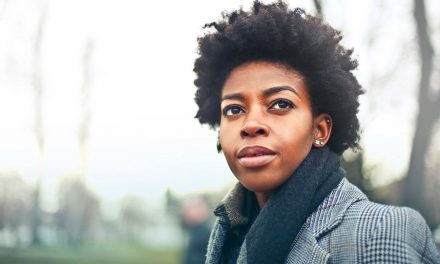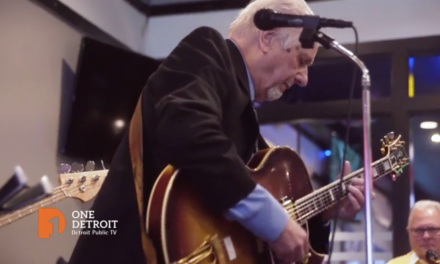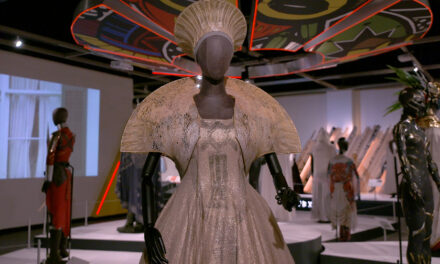Created to showcase the voice and stories of Black filmmakers, the 3rd annual Detroit Black Film Festival returns Sept. 21-25 this year with 86 different films by Black independent filmmakers from across the globe. Two days of screenings will be hosted at the Charles H. Wright Museum of African American History and the Marlene Boll Theatre, inside the downtown Detroit YMCA.
Kicking off the event, the Motown Museum will present a special opening night screening of “Lady Sings the Blues” at the Wright Museum in celebration of the 50th anniversary of the film’s release by Motown Productions.
RELATED: Detroit Filmmaker’s ‘Asbury Park’ Tells the Story of Inner City Struggles
RELATED: Spotlighting Detroit Talent: KAF21 Film Series Features 2021 Kresge Artist Fellows, Local Filmmakers
Host Stephen Henderson talks with Detroit Black Film Festival Co-founders Lazar and Marshalle Favors about what’s on tap for the five-day event and the types of films audiences will be able to view at the festival.
Full Transcript:
Speaker 1: One of the things that’s so amazing about locks, is that they’re all so unique because our hair is so unique. It’s almost like a fingerprint. I learned how lucky we are to have that kind of opportunity to express ourselves.
Speaker 2: The most beautiful things in life are always the hardest to accomplish. But if you put your mind to it, King, you can achieve anything. And when it really matters, do whatever you’ve got to do to concur the problem.
[music lyrics] Where ever you are / Whatever you’re faced with / Stand up tall / Against the wall / Determination.Speaker 2: You put everything on the line to do what’s right.
Stephen Henderson, Host, American Black Journal: Marshalle and Lazar Favors, two of my favorite Detroiters. Welcome back to American Black Journal.
Lazar Favors, Co-Founder, Detroit Black Film Festival: Thank you, Stephen. How have you been man? Appreciate being back, thank you very much.
Stephen Henderson: So, Lazar, I’m going to start with you. Congratulations on the 3rd annual Detroit Black Film Festival, but also, bigger congratulations on the opening night film, which you are partnering with the Motown Museum to show “Lady Sings The Blues” on its 50th anniversary. That is a big event.
Lazar Favors: That is a huge deal, man. Shout out to Robin over at the museum. We were discussing this over a year ago and we just thought it would be great. It was just timing, it was the 50th anniversary, it was our festival, we were like, “Hey, let’s just mesh those two things together and let’s see what we get out of it.” So, our opening night ceremony is the “Lady Sings The Blues” film, for anybody who knows– anybody from Detroit should know who’s in that film, and that’s Diana Ross. It’s one of the films produced by Motown Records and Berry Gordy. So, we’re excited about it, man. We’re super excited about it. And it’s at the Charles H. Wright Museum, you can’t ask for much more than that.
Stephen Henderson: Yeah, right. So, I feel like it’s a perfect sort of coming together of all the things that make the Detroit Black Film Festival special, this idea of the voice, and the culture, and the art that’s come out of Detroit in the middle of history.
Lazar Favors: Absolutely. You know, we’re very intentional about our experiences, our narratives, and our culture. And that’s our tagline for Detroit Black Film Festival; we’re very serious about that. And this just helps build that awareness and it marries very well for us. So, we were excited when me and Robin talked about it, we were just super excited, like, “Wow, this is like a big deal overall.” And for it to be our 3rd year, it’s like this is how you show up, I feel like this how you show up, partnerships are great, this is how you show up. Then, Ford Foundation came on with us, also, and helped push that narrative. So, it’s just a great thing happening this year.
Stephen Henderson: Yeah, and I won’t say how old that makes me, if this film is 50 years old.
Lazar Favors: I won’t talk about it either. They all came out a year after I was born.
Stephen Henderson: Marshalle, talk about the other films that we’ll be celebrating this year.
Marshalle Favors, Co-Founder, Detroit Black Film Festival: Well, we have 86 films from 14 different countries. And I’m just really, really excited because the genres are all over the board. We have documentaries, action, drama. We have a lot of short films for folks to enjoy. And what’s really exciting about it, also, is the fact that we have to always represent our own, so we have 14 films from metro Detroiters as well. And so, it’s going to be an exciting time.
Stephen Henderson: So, when you talk about films from folks here in Detroit, for a lot of them, this is a big break. I mean, this is their chance for, you know, other people to see their films. They may not get other chances. I know that is, Marshalle, one of the things that you guys are really focused on here, is lifting up folks who otherwise wouldn’t see that lift.
Marshalle Favors: I think that’s like the number one reason that we have the film festival, really, is to give a voice to filmmakers and artists. And to just really connect audiences with artists so that they have, not only a chance to experience the film, but have a dialog, and to have people come together and to talk about the films; that’s my favorite part. My favorite part is connecting with audiences and connecting with the directors.
Stephen Henderson: Yeah, I want to have you, Marshalle, also talk just a little about what’s gone on in the last 3 years and what effect you see not just in the film industry, but of course, with African-Americans in the film industry. We know that when things get set back, they get set back further for us. Talk about the pandemic and coming out of it, what we can expect.
Marshalle Favors: Well, I think that the pandemic really gave us a chance to shift, right. And we were able to virtually connect with audiences even that we wouldn’t have been able to connect with before and have a different type of experience. One thing that the pandemic did also was just, I think because of the uprisings, because of George Floyd and everything that was going on socially and politically, it gave artists a chance to really think about their art and the type of narratives that they wanted to put out there. And as I mentioned before about dialogs, it really helped us to connect in a way that we really needed to connect during the pandemic.
And oh my goodness, so much has changed, even in terms of audiences and eyes and broadening audiences for African-American stories. And so, I think that there’s no limit right now. We’ve seen achievements that we haven’t seen in the past years. And so, that’s opened up opportunities and doors for artists to just expand their work and have even more eyes and ears on it. And I think going forward, you’re just going to see more great content.
Stephen Henderson: [00:06:52] I want to, before we end, give you a chance to talk about what your favorite film is that’s showing. And I know that’s asking somebody to choose among their children, but talk about something that people have to see.
Lazar Favors: I’ll say this, “Sons of Toledo” is an amazing short film, an amazing short film; that’s a must-see film. “If These Locks Could Talk”, a must-see film. “The Woodstock Of House”, a must-see film. And it’s several other ones, you know, it’s a lot. “Black Day” is a must-see film documentary. I’m suggesting all fathers, grandfathers, uncles, cousins, sons, see this film; it’s a great film.
Stephen Henderson: Yeah, I know it’s an unfair question, but I’m going to ask it of you, too. Tell me which films people have to get out and see this year.
Marshalle Favors: Oh, you’re not going to put me in that box. He’ll go ahead and tell you his opinions, but I say across the board, I’m not going to play any favorites, come see the movies! Come see all of them. But I will say this, that we were really, really excited to have a film by Sir Steve McQueen. It’s a short film and it’s opening the festival, one of the films that are opening the festival, and it’s about prostate cancer and dialogs in the African-American community around that subject. So, I’m going to be a neutral ground here, I’m going to say, come see the films.
Stephen Henderson: Come see them all, right? All right, Marshalle and Lazar Favors, congratulations again on the festival, and thanks so much for joining us here on American Black Journal.
Lazar Favors: Thank you, Stephen.
Marshalle Favors: Thank you for having us.
Stay Connected:
Subscribe to Detroit Public Television’s YouTube Channel & Don’t miss American Black Journal on Tuesday at 7:30 p.m and Sunday at 9:30 a.m. on Detroit Public TV, WTVS-Channel 56.
Catch the daily conversations on our website, Facebook, Twitter and Instagram @amblackjournal.
View Past Episodes >
Watch American Black Journal on Tuesday at 7:30 p.m. and Sunday at 9:30 a.m. on Detroit Public TV, WTVS-Channel 56.




